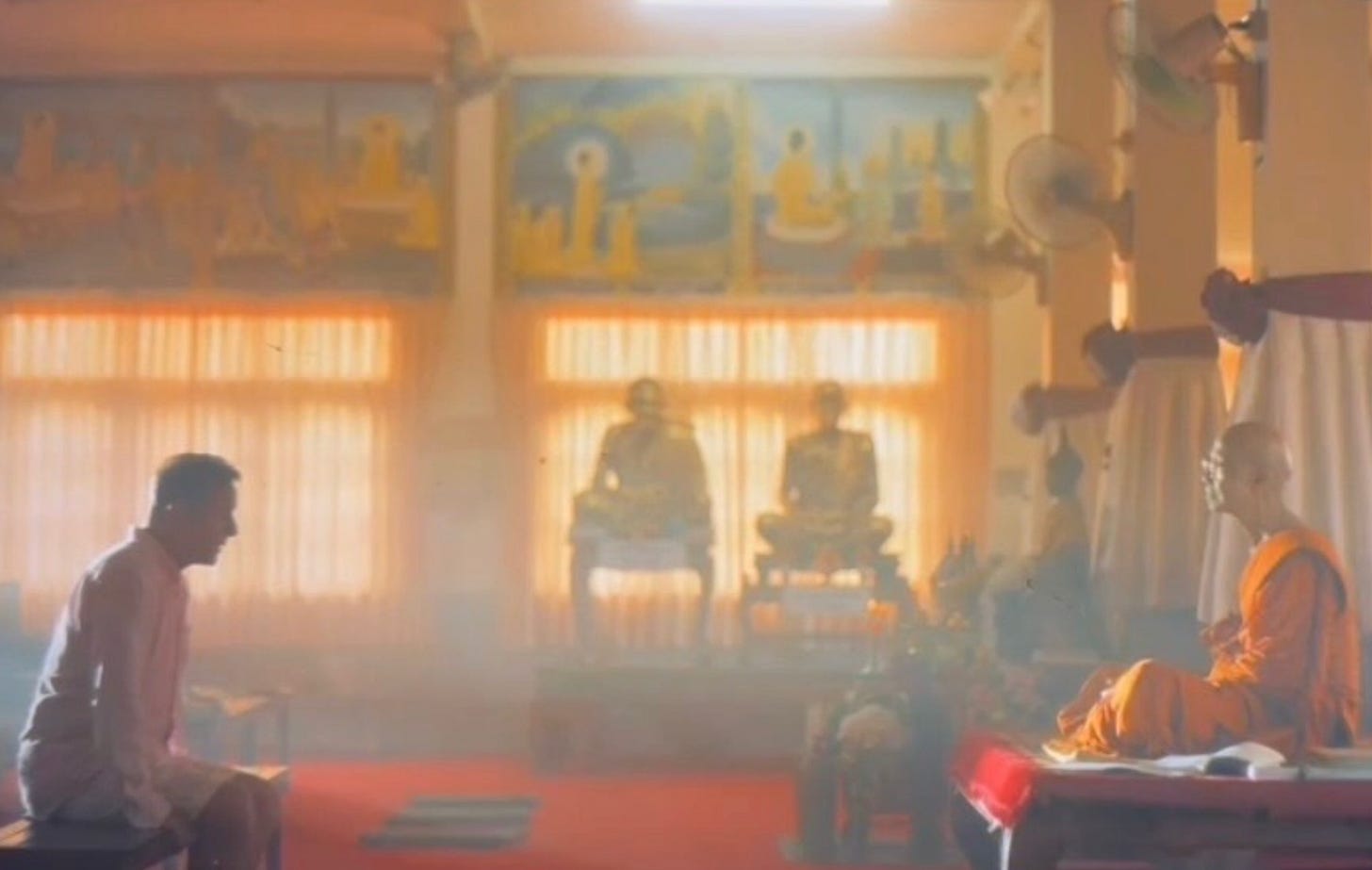It’s not every day you see your father on TV!
Well… actually, I did grow up seeing my father on TV in Thailand—just not as a monk in saffron robes. He was on screen as a journalist, delivering breaking news, analyzing current events, or interviewing interesting people. He simply never appeared as an actor playing a spiritual teacher.
So when this scene aired the other night (the younger monk is my older brother—who, for the record, is also not a monk in real life), it felt surreal. Exciting. And yes, a little terrifying!
If you haven’t heard, the monk in the new season of The White Lotus is indeed played by my father, Suthichai Yoon. His character is a wise and influential Buddhist teacher, with books and teachings that inspire people—even bringing a North Carolina family all the way to Thailand so their daughter could meet him. The father in this family, Tim, is in quite a predicament. “Anxious” is an understatement as he sits before the monk, hoping for wisdom that may—or may not—change his fate. We’ll have to wait for the next few episodes to find out.
Now, if you don’t watch The White Lotus (and honestly, you don’t have to—it’s dark, potentially inappropriate for some, and often disturbing), I still wanted to share what my father’s character said in this scene.
Because maybe, just maybe, it’s something you need to hear right now.
“Many young people come here from your country I think because maybe spiritual malaise. Lost connection with nature, with the family, lost connection with the spirit.
What is left?
The self. Identity. Chasing money, pleasure, yeah?
Everyone run from pain towards the pleasure. But when they get there, only to find more pain.
You cannot outrun pain.”
You can also watch the video clip here:
Here’s Buddhism 101, if you are interested:
In Buddhism, we believe that life is suffering.
Not the most uplifting perspective, I know.
But when we acknowledge this truth, we make space for the pain that comes with living—while also working to lessen our discomfort through intentional thoughts and actions.
Pain shows up in many forms, and often, we create it ourselves through the thoughts we choose to believe.
What do I mean by this?
Here are some examples of thoughts we have about ourselves that generate unnecessary suffering:
I am a terrible person (or mother, wife, son, friend, manager, daughter—insert any role here).
I am not doing enough for my family.
I am not good enough.
I should have done things differently.
I am worthless.
I failed.
I can’t believe I let that happen.
I wish I had taken better care of myself.
We have about 60,000 thoughts a day, and most of them are negative like the ones above—creating emotions that feel like pain (inadequate, shame, guilt, disappointment, regret, etc).
When we experience pain, we’re wired to avoid it and seek pleasure instead. But often, that pleasure is fleeting and inauthentic, leading to even more suffering.
So what can we do?
Instead of resisting discomfort, we can accept that pain is part of life.
Instead of looking for external sources of pleasure, we can turn inward and cultivate true contentment.
Instead of distracting ourselves from difficult emotions, we can practice mindfulness—learning to observe our experiences rather than feeling trapped by them.
Who knew The White Lotus could deliver so much wisdom in one small scene?!
If you’d like to hear more from my father and brother—not as Buddhist monks, but as their everyday wise and wonderful selves—check out my podcast episode with them here.
You will see why I feel so grateful that I get to call them family.
With love and gratitude,
xoxo
Kit








I loved the scenes with your dad because of what his character said and the joy he showed at the same time. Wow! Kudos to your dad and brother.
Thank you for sharing this persepctive!